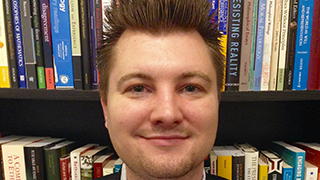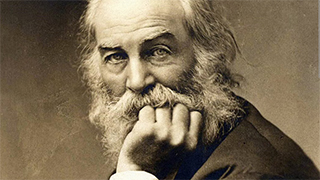Dr. Travis Timmerman (Philosophy) Awarded NEH Grant - Seton Hall University
Friday, April 21, 2017

Philosophy Professor Travis Timmerman has received a summer grant from the National Endowment for the Humanities (NEH) for his work in ethics. The highly competitive grant will be used to conduct further research in a debate concerning the connections between one's free choices and their moral obligations. Much of the work will focus on a new view known as "hybridism," a theory Timmerman has been credited with helping to develop.
This line of inquiry, the actualism/possibilism/hybridism debate in ethics, concerns the following question: What is the relationship between the choices a person freely makes and her moral obligations?
This is a fundamental issue in ethics, yet it only began receiving attention in the philosophical literature recently. To help make this abstract question more concrete, here's a particular case.
The Wedding: Your ex-partner invites you to her wedding, and it would be best if you accepted the wedding invitation and attended without misbehaving—something you can do at little cost to yourself. But, due to your jealousy, if you were to accept the wedding invitation, you would misbehave at the wedding. Thus, it would be better to decline the invitation rather than to accept it and misbehave. But declining would be worse than accepting and behaving.
Actualists say that you are obligated to decline the invitation because what would actually happen if you decline is better than what would actually happen if you accept.
Possibilists say that you are obligated to accept because it's possible for you to both accept and behave. So, they think, you should accept because doing so is necessary to complete the best possible action.
Hybridists say that you morally ought to accept the invitation, yet practically ought to decline the invitation. Always acting in accordance with the first "ought" ensures that one fulfills all of one's moral obligations, while acting in accordance with the second "ought" ensures that one minimizes wrongdoing in light of one's moral shortcomings. The practical "ought" takes your shortcomings into its prescriptions, telling you to perform a wrong act now in order to prevent yourself from performing an even worse act later.
Timmerman, and his co-author Yishai Cohen, are known for creating "hybridism." Hybridism is in the early stages of development, but appears to be a promising alternative to the other views on offer. For the NEH summer grant, Timmerman will write two papers exploring the relationship between hybridism and blameworthiness, arguing that the correct account of blame actually supports the view he helped develop. A person is blameworthy just when they culpably perform an act that, relative to their evidence, is morally wrong. Only hybridism can accommodate this fact about blame without leading to absurd consequences.
The Stanford Encyclopedia of Philosophy is currently reviewing a proposal from Timmerman and Cohen for an encyclopedia entry on the actualism/possibilism/hybridism debate; the authors hope to complete the project and publish within the next year.
Timmerman earned his Ph.D. in Philosophy from Syracuse University in May 2016. His research interests are primarily in ethics and the philosophy of death. In addition to the actualism/possibilism/hybridism debate, Timmerman focuses on questions concerning death's badness, global poverty, and animal welfare. Recent publications on death include "Avoiding the Asymmetry Problem" forthcoming in Ratio, "Your Death Might Be the Worst Thing Ever to Happen to You (But Maybe You Shouldn't Care)" in the Canadian Journal of Philosophy (2016), and "Reconsidering Categorical Desire Views" in Rowman & Littlefield's Immortality and the Philosophy of Death (2016).
Recent publications on animal welfare include "You're Probably Not Really a Speciesist" forthcoming in Pacific Philosophical Quarterly. Recent publications on global poverty include "Sometimes There is Nothing Wrong with Letting a Child Drown" in Analysis (2015) and a review of Peter Singer's "The Most Good You Can Do" (2016) in the Philosophical Quarterly. Recent publications on the actualism/possibilism/hybridism debate include "Does Scrupulous Securitism Stand-Up to Scrutiny?" in Philosophical Studies (2015) and, with Yishai Cohen, "Moral Obligations: Actualist, Possibilist or Hybridist?" in the Australasian Journal of Philosophy (2016), and "Actualism Has Control Issues" in the Journal of Ethics and Social Philosophy (2016).






